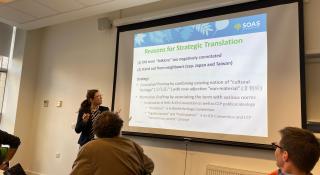
Breadcrumbs navigation
BISA rejects report of the Commission on Race and Ethnic Disparities
At the end of March the Commission on Race and Ethnic Disparities issued its long-awaited Report. That report, commissioned by the UK government, has been met with significant disappointment and criticism. BISA shares those sentiments.
Alongside colleagues in the British Sociological Association, Educational researchers, education unions and others who have rejected the document and its findings, we consider the report and the means used to produce it deeply flawed. BISA is an association of leading experts in international politics, including on the histories and legacies of colonialism and slavery, as well as ongoing global racial inequalities. As experts in these fields, we regard as deeply problematic the report’s denial of structural and institutional racism within the UK and its neglect of the UK’s role internationally and historically in instigating and maintaining global inequalities.
Moreover, we are deeply troubled by the evidence of poor academic rigour. The exclusion of key research findings on race and inequality, including by BISA scholars, the misrepresentation of existing research, and denial of the lived experience of racialised communities within Britain, point to overwhelming flaws in the report’s methods and conclusions. Reports of government having directly edited the report before release also raise questions about how far expert input was adjusted for political purposes.
Research conducted by Universities UK, by UK Research and Innovation, by the British Sociology Association, and others, has time and again demonstrated, institutional and structural racism remain key issues within our Higher Education communities – in our teaching (e.g. the absence of race from core curriculums), staff and student experiences (e.g. the underrepresentation of staff and students from racialised communities within UKHE; degree and professional awarding gaps; on and off-campus microaggressions and racial harassment), and in our research practices. Finally, the overwhelming wealth of properly conducted, rigorous research has demonstrated that these challenges extend across UK society, and to UK practices globally.
We therefore reject the Commission’s report. It is a significant step backwards in terms of racial equality and promoting the role of the UK as a truly global leader.


